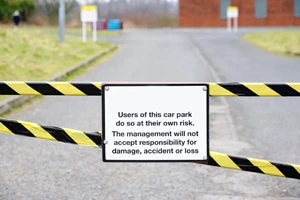What is the difference between premises liability and general liability?
 This is a common question. Premises liability refers to circumstances where an owner or manager of a property failed to maintain the physical premises of a property, and someone was hurt as a result.
This is a common question. Premises liability refers to circumstances where an owner or manager of a property failed to maintain the physical premises of a property, and someone was hurt as a result.
Examples of Premises Liability in North Carolina
There are a wide variety of situations in which premises liability can occur. This is not an exhaustive list, but should give you an idea of some common ways in which premises liability may happen:
- Slip and falls. If you fall and get hurt on someone else’s property, that may be a situation of premises liability. For example, maybe you’re shopping in a clothing store and trip on a loose tile, injuring your back. The owner or property manager should have maintained the flooring and fixed the loose tile, because they have a duty to provide a safe environment for customers. If they failed to handle this situation, you may have a case for premises liability. Other circumstances where a person could slip and fall, such as failing to clear ice from a walkway, or failing to put up a sign warning guests of a wet floor, may also apply.
- Broken or damaged stairs may also be a fall hazard.
- Lack of handrails on staircases may present a liability.
- Failing to maintain landscaping could be a problem. For example, shrubbery that isn’t pruned and blocks a person’ view of a potential hazard may lead to injury. Another example is failing to cut down a dead tree that could fall and injure someone.
- Not placing warning signs about potential hazards. Aside from “wet floor” signs there are many other potentially dangerous situations an owner or manager should warn others about. For example, if there are dangerous chemicals stored or used in a room, a sign warning of the dangers and protection options should be placed on the door.
- Not sealing off potentially hazardous areas. For example, the manager of a hotel with a pool should have the pool area fenced off. That way a small child who can’t swim won’t be able to get to the pool easily if they wander away from a parent. Similarly, the room where the pool chemicals are stored should be locked.
Common Injuries From Unsafe Premises
Because many premises liability cases involve a fall of some kind, both traumatic brain injury (TBI) caused by hitting the head, and broken bones in various areas of the body, are very common. Broken bones can be painful and expensive to treat, in some cases requiring surgery, and may leave you out of work for weeks or months. Traumatic brain injuries can lead to a wide variety of chronic problems, from severe headaches to neurological symptoms like memory loss or cognitive impairment.
People exposed to dangerous chemicals may have a large array of injuries, depending on the specific chemical and the nature of their exposure. If the chemicals involved are flammable and a fire occurs, the victim may suffer severe burns.
If You Were Hurt On Someone Else’s Property, Do You Have a Premises Liability Case?
This depends on many factors involved in the injury, but in some cases, yes, you may have a liability claim. If you pursue a premises liability case, your attorney will need to demonstrate that the owner or manager failed to safely maintain the property, and that this lack of maintenance led to your injury. Whether this can be done or not depends on what kind of evidence you have.
If you’ve been hurt and are wondering if you have a case, your best option is to contact a North Carolina premises liability law firm like Auger & Auger Accident and Injury Lawyers for a free consultation. Your lawyer will ask you questions about what happened and determine who, if anyone, is likely to be liable in this situation. They can then advise you on your options for moving forward with a claim.














